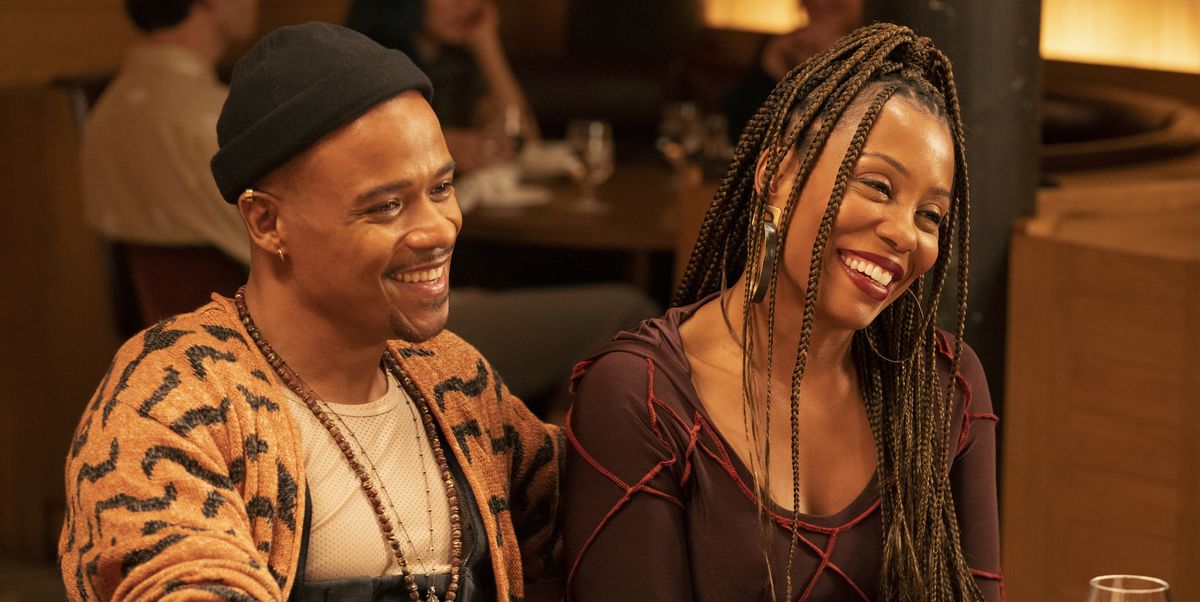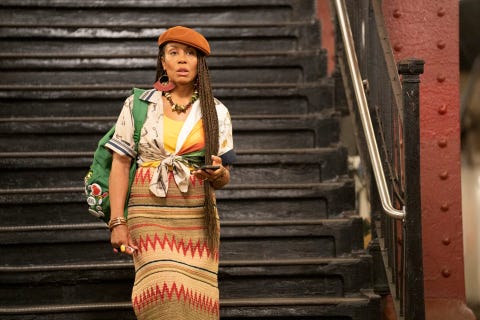One could argue And Just Like That’s Nya and Andre exist on a different plane of reality than the other couples in HBO Max’s Sex and the City reboot. The blissful wife and husband, as played by Karen Pittman and LeRoy McClain, seem to be the only pair not engaging in absurd behavior every available moment—whether blowing up a marriage in favor of “comedy concerts,” hiding BJs from their daughter, or signing off on a date by puking, in perfect unison, into a gutter. Nya and Andre, by comparison, have it good.
Except for one tiny thing: Dre wants a baby, and Nya’s not convinced. She’s done the IVF thing a few times now, she tells Cynthia Nixon’s Miranda, but it doesn’t seem to be working, so surely it’s best to drop the idea, right? By the time AJLT’s most recent episode hit the streamer, Dre and Nya had settled it: No more baby talk. But when Dre helps paint Nya’s passion project—a women’s shelter in Brooklyn—he catches sight of a “Norman Rockwell” scene, in which Lisa Todd Wexley’s husband rolls gobs of Benjamin Moore onto the wall with his little ones. Dre is stricken and immediately decides to reopen the baby query.
Nya, paintbrush in hand, is displeased. “Our entire 15-year relationship has been about you and me; my work, your music,” she tells him. He hits back: “Well, am I not allowed to pivot?”
“A child is not a pivot,” she says, then later adds, “Andre, don’t make this miracle of us finding each other not enough.”
And Just Like That… isn’t, perhaps, known for exploring life’s biggest challenges with sweeping nuance, but there’s something to be said for the narrative opportunities Nya and Andre’s dilemma presents. This isn’t The Lost Daughter, but Nya’s argument is a valid one, more often seen in moody cinema than in playful dramedies like SATC: Parenthood changes everything. If we’re being honest with ourselves, do we really want to change everything? And what happens when our partner wants it more than we do?
While Miranda’s affair (and eventual, uh, “dating but not dating” relationship) with comedian Che continues to suck up audience attention, the knottier—and far more realistic—relationships on AJLT are left with only a few minutes of screen time. To further explore Nya and Dre’s impasse, and what it might stir up in next week’s finale, Pittman brought us deeper into Nya’s mindset.
When you and the show’s creators discussed how to address the story of Nya’s infertility, what were the things you wanted to focus on most?
This is a beautiful, happy marriage. She loves her husband. They’re happy. And the thing that I wanted to make sure that we showed was that this isn’t a couple who is in conflict, in any other way. The very minuscule nuance of how people separate a little bit, and then that crevice becomes a much wider space, that they can’t traverse to each other. And what that looks like and how they figure out how to make their way back to each other.
There’s a very different energy when you are starting with a character that you know is already very joyful. She’s very positive. There’s no melancholy in her or conflict. So what was very important to me was [the conflict] was very subtle, and it was very small, and that we not tip to the audience where the story might go. That we know that Nya’s really sturdy in herself and in her marriage.
I thought it was really important to put someone like that on this platform, because I think, No. 1, the story of African American women is that we’re super-strong. I wanted to be able to help her blossom and show a woman who isn’t just strong—kind of a stereotype there—but who was very soft and vulnerable and has fragility, just like any other woman that we might encounter in life. That mostly comes across in her relationship with Andre.
Often when we see an arc about infertility in television or film, it’s about how badly the woman wants a baby. But Nya is different. She vacillates. In your opinion, what does she want? Does she know what she wants?
I think Nya knows what she wants. And [writer] Keli [Goff] and I spend a lot of time talking about it.
I have two children. So, I know that women definitely have challenges around pregnancy and getting pregnant. But I also know that motherhood, once you get there, is a little bit overrated. You don’t actually see yourself in your children. Your children get their own personalities, and they grow up, and you are in that space of, “Oh, but I thought you were going to complete me.” Like any relationship, motherhood has its drawbacks.
One of the things we don’t talk about is where the problem is. Is it Nya, or is it Andre? Nor did the writers ever tell me who it was. I remember having a conversation with Leroy, where Leroy was, “Oh, I thought it was Nya.” I was, “Oh, that’s funny. Because I thought it was Andre. I thought you were the problem, my friend.” He was, “Oh, that’s so funny. I thought you were the problem.” That’s interesting.
By the time episode 9 rolls around, Nya and Andre had decided to stop trying to conceive. And then, watching Lisa Todd Wexley’s kids, Dre changes his mind. Did it surprise you, this turn of events?
Yeah, it did. It did. I don’t want to give away what happens in episode 10. But yeah, I definitely was surprised. It continues to twist as they go through, I wouldn’t call it a cliffhanger. But it is an interesting place where they land, at the end of episode 10. I don’t know if there are easy answers. I think it continues to be a challenge, for Nya to figure it out. She continues to lean on Miranda, to figure what that’s going to be.
You mentioned Miranda. I have to get your take on their friendship. When Miranda and Nya first meet, they have an awkward interaction in which Miranda mistakes Nya for a student because of her braids. What are your thoughts on how she and Nya build their relationship, especially given how it started?
I think a lot of it has to do with the audience and the way people are seeing it. I think we live in a country right now where, if you have differences with someone else, you’re in danger of being canceled. You’re in danger of losing your job. Being thrown off Twitter. There is this sort of disposable energy that we have around people and relationships in our lives now.
So, I’ve been fascinated by the response of immediately feeling like Miranda has fallen off the cliff, the character has fallen off the cliff, instead of: Miranda’s genuinely just learning something and challenging herself to be in a new place.
I think race is a cumbersome conversation. I think how we connect to people who are different from us is a difficult conversation for us to have. But I think it’s one that is worthy exploring…I think the response that the audience is having has nothing to do with just seeing these two women trying to forge a connection, as a professor and student. It’s two women who find they have common ground, a lot in common. It’s really interesting to me, how the audience is responding, based on what they’ve dealt with over the last several years.
You mentioned common ground between Miranda and Nya. What exactly is that common ground? What draws them to each other?
I think it’s that genuine energy of wanting to see themselves articulated in the world. Self-realization, as it looks like for women. I think Miranda is more mature than Nya: Nya is [thinking] that, She has the right personality to help me figure out how to do my life well. And in Nya, [Miranda] sees a woman who has moved in the direction of realizing herself and her intention in the world and manifesting it. I’m getting very woo-woo there, but Nya has manifested her life in a very specific way that Miranda has yet to see in her [own] life. I also think that they make each other laugh, like friends do. They have a good time together.
Something, in my experience as an African American woman, is that, the women who are different from me, and sometimes my white girlfriends, would look to me to step into the role of supporting them and being a mother to them and nurturing them. In my tribe, in my circle of women, we call it “the mammy vibe.” You become a kind of a mammy to the women that are around you. I think Miranda’s not doing that with Nya, and Nya’s not doing that with Miranda. They really are equals. They’re meeting each other at the same place.
What sort of audience response do you expect from Nya’s infertility storyline?
I will say, the little nuance here for Black women is that, if you are a Black woman in a good marriage with a great Black man, and you are making great money, [the message is], why wouldn’t you have a child? Bring a child into that, of course. For Black women, I think it’s very specific. But I think for all women, a universal question is: When do I interrupt my purpose in life, to bring another human being into the world? It changes your financial picture. It changes your social and emotional picture. It changes your body. It changes the entire life for the rest of your life.
My mother literally paid the tax for me, as a woman, to grow up and get two degrees and live where I live and put on fancy clothes. She was a teacher and a scientist for most of her life and deferred many of her dreams, so that I could be up front. And I definitely feel conflicted about my mother having given all of that up. The sacrifices that women, our mothers, make, in order for us to go out and see ourselves fully in the world. I think that’s so important nowadays.
We’re living in a space where we actually think we could break through glass ceilings. But for children, because that shit will slow you down. And for someone like Nya, who’s all, “I love this. I don’t want anything to slow me down.” But the man she’s partnered with for life is, “I want this.” So, I think that women relate to it.
I think, for all the many appetites that Nya has, she has very little appetite for motherhood. And to do it out of obligation, I think, is the real question that she has and, I think, a lot of women grapple with.
This interview has been edited and condensed for clarity.
This content is created and maintained by a third party, and imported onto this page to help users provide their email addresses. You may be able to find more information about this and similar content at piano.io

